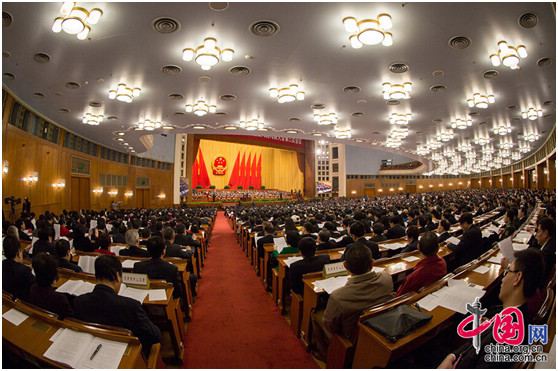China SOE reform back on track amid concerns
- By Zhang Lulu
 0 Comment(s)
0 Comment(s) Print
Print E-mail China.org.cn, March 15, 2015
E-mail China.org.cn, March 15, 2015
Reform of China's state-owned enterprises is back on track after a decade.
|
|
|
The third plenary session of the 12th National People's Congress opens at 9 a.m. on March 5, 2015 in Beijing. [Photo/China.org.cn] |
During the landmark third plenum of the 18th Chinese Communist Party Congress held in 2013, China announced an overhaul of its state-owned sector.
Pilot programs have since been carried out in six of the country's SOEs. In the currently ongoing legislative meeting, the National People's Congress (NPC), reform also took up a paragraph in the government work report delivered by Premier Li Keqiang.
The legislators, some of whom are working in the corporate sector, yearn to see where this new round of reform is leading to.
Reform as the "new historic mission"
China's state-owned firms generated a total of gross revenue of 48 trillion yuan (around US$7,680 billion) in 2014, up 4 percent year on year, according to data released by the Ministry of Finance.
But the return on assets, an indicator gauging asset performance, was around 6 percent lower than their private peers, according to figures compiled by economists. The SOEs also have a higher liability rate than their private counterparts.
"China's SOEs have contributed to the country's economic development throughout its history, but their shortcomings are emerging now, especially after the global financial crisis which forced the Chinese economy to transform its growth mode. The new historic mission for the SOEs, if there is one, is its own reform." said Bai Liqun, a deputy to the NPC, in an interview with China.org.cn on March 12. Bai is also president of Lianyungang Port Group, a city-level SOE.
"China's SOE reform has been an important task since reform and opening-up, but it is a regrettable one, as an approach to make a breakthrough has never been found. Reform of the SOEs lags far behind the reform of the entire Chinese economy." Bai said.
"If we do not make strides in SOE reform, they will impact on the stable development of the Chinese economy and society." Bai added.
Xu Guoping, chairman of the Jiangsu State-owned Assets Supervision and Administration Commission (SASAC), analyzed the difference between this round of SOE reform and the previous round, which took place in the late 1990s. "During the last round of reform, the SOEs were going one of their most difficult periods. Many of them were in the red, and could not even afford their employees' salaries. But this round of reform is mainly concerned with the inefficiency of the companies and preventing further losses in state-owned assets," Xu said in an interview with China.org.cn on March 13.







Go to Forum >>0 Comment(s)